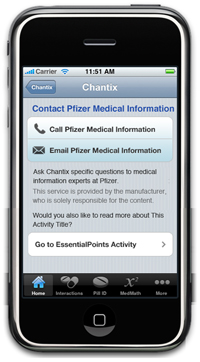Pfizer is experimenting with electronic medical records and mobile technology to detect safety issues sooner.
The company is partnering with Sermo, Epocrates and Brigham and Women’s Hospital in Boston on projects aimed at making it easier for doctors to report adverse events information or ask questions about Pfizer medications, according to a Dow Jones report.
A collaboration with Harvard-affiliated Brigham and Women’s Hospital, codenamed “Aster (Adverse drug event Spontaneous Triggered Event Reporting),” uses automated prompts in the hospital’s computer system to encourage adverse event reporting – when, for example, a doctor changes the dosage of a drug. That data is then automatically passed on to FDA and the companies. The system also collects more information about a patient’s background in order to make it easier to determine whether an adverse event was caused by a drug or some other factor.
“We essentially demonstrated that you could make it easier for physicians to report adverse events thorough leveraging the electronic record,” Pfizer chief medical officer Freda Lewis-Hall told Dow Jones.
Pfizer has also placed a “contact manufacturer” button on Epocrates’ mobile reference app, used by 275,000 physicians, which allows them to contact Pfizer’s medical affairs department directly, via phone or email, to ask questions about Pfizer products. Companies can segment that feature, said an Epocrates spokeswoman, so that it only appears to, say, high-decile prescribers (though Pfizer doesn’t do so).
Similarly, Sermo has added a feature making it easier for its physician members to contact Pfizer with questions about its medicines.








